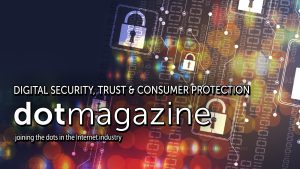Security is on everyone’s mind these days, and rightfully so – it’s an essential component of all digital services. Without robust security measures, building long-term trust and consumer protection becomes nearly impossible. That’s why, in this month’s dotmagazine, we’re once again diving deep into the latest security insights and strategies. As members of the digital ecosystem – whether as end users, company employees or industry partners – we all have a role to play in securing our systems.
Email security: Why protecting communications is non-negotiable
Security challenges extend to the everyday tools we rely on, such as email – one of the most ubiquitous yet frequently abused digital communication tools. With cyber threats escalating, Claudia Plattner, the President of Germany’s Federal Office for Information Security (BSI), is sounding the alarm. She makes it crystal clear that email security can no longer be an afterthought; it’s a shared responsibility that demands collaboration between businesses, government and tech providers.
Embracing a practical, holistic approach to cybersecurity
Just as businesses must collaborate on email security, organisations also need to adopt a holistic view of cybersecurity strategies. As accentuated by Thomas Tschersich from Telekom Security, a 360-degree approach is essential. It’s not enough to just focus on cyber threats – we also have to consider workforce challenges, geopolitical risks and supply chain vulnerabilities. Tschersich’s perspective drives home the need for us to rethink our security mindset: we need to move away from a narrow focus on compliance and audits to a more integrated, practical approach.
Michael Weirich from eco further reveals invaluable insights shared during the Internet Security Days (ISD) panel, where experts emphasised the critical need to fortify defences against evolving cyber threats. A key focus was once again on email security, highlighting how secure communication practices, such as implementing multi-layered defences, are essential in mitigating risks from phishing and other email-based attacks. In the same spirit, Jochen Schönweiß from Nameshield highlights the importance of implementing DMARC (Domain-based Message Authentication, Reporting & Conformance) and BIMI (Brand Indicators for Message Identification) to protect against phishing and spoofing, which pose growing threats to companies’ reputations and operational integrity.
AI in cybersecurity: Balancing innovation and risk
In light of evolving security challenges, Prof. Norbert Pohlmann from the eco Board underscores how artificial intelligence (AI) is a double-edged sword in cybersecurity. While AI is a powerful tool for defending IT systems, Pohlmann explains that it also enables more sophisticated cyberattacks, and emphasises just how essential it is to have continuous human oversight. In echoing this sentiment, Dr. Or Sela from F5 highlights that AI is not a quick fix but requires robust infrastructure – strong connectivity, security and scalability – to be effectively deployed.
The human factor: How behaviour and awareness drive digital security
Overall, human behaviour plays a central role in cybersecurity. Sven Krohlas from Spamhaus outlines how tools like spamtraps, passive DNS (Domain Name System) and enhanced account security can detect and prevent online abuse before it impacts customers, safeguarding both reputation and trust. Meanwhile, Thomas Amberg from Ynvolve highlights the limitations of vendor lock-in, explaining how it hinders Managed Service Providers (MSPs) from adapting to evolving business demands. He advocates for adopting a hybrid IT strategy as a way to break free from these constraints, optimise costs and ensure scalability for long-term success.
Safeguarding trust in the digital age
Considering these expert insights, it’s clear that we all have a responsibility to prioritise security and take proactive steps to protect ourselves, our organisations, and the broader digital ecosystem. Together, we can make a difference. So, what immediate actions will you take today to enhance your defences and contribute to a safer online environment for all?





